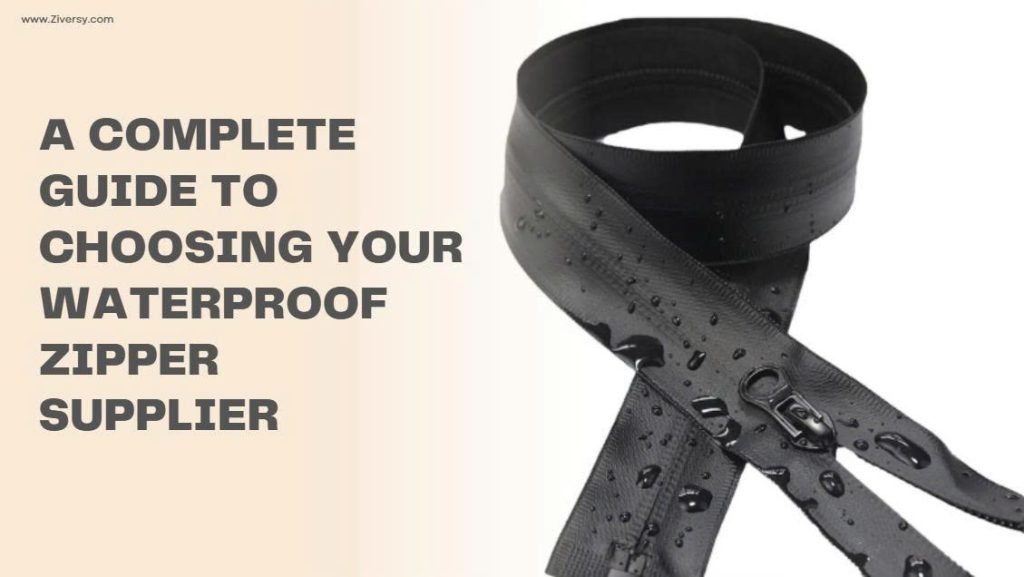Blog
A Complete Guide to Choosing Your Waterproof Zipper Supplier
Choosing the Right Waterproof Zipper Supplier: A Key to Durable Outdoor Gear
When producing outdoor equipment and heavy-duty apparel, material selection is the foundation of product performance and longevity. Among these materials, waterproof zippers stand out as critical components that keep water out while maintaining functionality and style. For wholesalers and manufacturers, finding a reliable waterproof zipper supplier is essential to creating products that exceed customer expectations.
This article explores what waterproof zippers are, where they’re used, and how to choose the ideal supplier for your manufacturing needs.
What Are Waterproof Zippers?
Waterproof zippers are engineered to prevent water penetration while ensuring a secure closure. They differ from airtight zippers, which create a sealed environment to prevent gas or air leakage. Instead, waterproof zippers use coatings or sealing mechanisms on the tape to block water.
Typical applications include:
Why Waterproof Zippers Are Essential
Waterproof zippers provide a protective barrier that keeps clothing, bags, and gear dry even during heavy rain or snow. Their durability and water resistance are particularly vital for gear that is frequently exposed to wet environments, such as marine equipment or hiking backpacks. By integrating these zippers, manufacturers increase the overall durability of their products, improving customer satisfaction and product trust.
Key Components of Waterproof Zippers
For curved seams in products like tents or rainwear, coil zippers are often preferred because they combine flexibility with reliable waterproofing.
How Waterproof Zippers Are Made
The production process begins with carefully selecting high-quality materials for the teeth, tape, and sliders. Each part is precisely cut and assembled to ensure smooth operation and water resistance. Throughout manufacturing, zippers are rigorously tested for strength, waterproofing, and durability, ensuring they meet industry standards before reaching the market.
What to Look for in a Waterproof Zipper Supplier
- 1Variety and Quality: A strong supplier should offer different zipper types (coil, Vislon, separating) and sizes (#3, #5, #8, #10).
- 2Industry Experience: Established suppliers understand the unique requirements of outdoor gear and industrial clothing.
- 3Customization and Technical Support: Look for suppliers offering custom colors, branded pulls, or special locking systems.
- 4Compliance: Certifications like ISO 9001 guarantee reliability and quality.
- 5Consistent Supply Chain: Reliable delivery schedules are vital to keep production on track.
- 6Competitive Pricing: Ensure that the price-quality ratio suits your budget, especially for bulk orders.
Types of Waterproof Zippers
Selecting the Right Zipper
To choose the best zipper for your product, consider:
Sourcing Tips for Manufacturers
Case Studies: Success with Waterproof Zippers
Case 1 – Outdoor Gear Manufacturer: By integrating lightweight coil zippers with a water-resistant finish, one hiking gear brand boosted customer satisfaction by 45% for its rainwear products.
Case 2 – Marine Equipment Supplier: A marine company using custom Vislon zippers reduced zipper failures in salty conditions by 30%, improving customer trust and product reviews.
Future Innovations
The waterproof zipper market is evolving with:
Final Thoughts
Choosing the right waterproof zipper supplier is an investment in quality and brand reputation. By partnering with reliable suppliers who offer customization, consistent quality, and innovative designs, your products will stand out and perform under all weather conditions.

